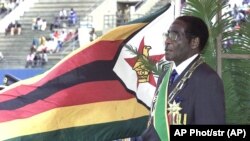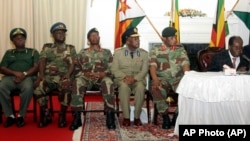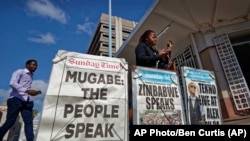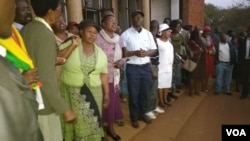Far from the resignation speech that many expected to hear from Zimbabwe President Robert Mugabe, Sunday, the exact opposite happened.
In a 20-minute, televised speech, which showed President Mugabe flanked by the uniformed generals who have been holding him hostage since they took over the state last week, on side, and his support team on the other, President Mugabe instead re-enforced his position as the head of the country, and offered a recognizance of sorts, for the military’s action.
“I as the President of Zimbabwe, and as their Commander in Chief, do acknowledge the issues they have brought my attention to and do believe these were raised in the spirit of honesty and out of deep patriotic concern for the stability of our nation and welfare of our people,” said President Mugabe.
Echoing the very denial by the military when it took over the state broadcaster, Tuesday, that there was no coup, President Mugabe assured the nation that while “a few incidents” may have happened during what he called “the operation,” nothing was harmed beyond repair.
“The operation I alluded to did not amount to a threat to our well-cherished constitutional order, nor was it a challenge to my authority as head of state and government,” he emphasized, “not even as Commander in Chief of the Zimbabwe Defense Forces.”
Mr. Mugabe went on to commend the military’s “respectful and comported,” treatment of him since the incident, which proceeded the ouster of Vice President Emmerson Mnangagwa.
“Even happier for me, and arising from today’s meeting is a strong sense of collegiality and comradeship, now binding the various arms of our security establishment,” he said.
Dispelling further speculation of a coup, President Mugabe expressed his happiness for the manner in which the country continued to function after the military takeover.
“True, a few incidents may have occurred here and there, but these are being corrected. I am happy that throughout the short period, the pillars of state remained functional,” President Mugabe said.
Praise for Zimbabwe’s Citizens
Further surprises followed as President Mugabe expressed admiration for the citizens of his country, who the day before had turned out in one of the largest crowds ever seen in Zimbabwe, to demand his resignation. President Mugabe acknowledged the “concerns that have come from” the citizens, many who showed anger and frustration at his 37-years in office.
“If there is any one observation we have made and drawn from events of the past week is the unshakeable pedestal upon which to rest our state of peace, law and order, amply indicating that as Zimbabweans we are genuinely peaceably disposed people,” he said, adding that the “dignity, discipline and restraint” shown by Zimbabweans was “to be admired.”
Still in Charge
Making no mention or acknowledgement of his ouster from the ruling Zanu-PF party by his long-time colleagues earlier in the day, President Mugabe, said he will preside over the upcoming Extraordinary Congress in December.
“The congress is due in a few weeks from now, I will preside over its processes which must not be pre-possessed by any acts calculated to undermine it or to compromise the outcomes in the eyes of the public,” said President Mugabe, disregarding his party’s resolutions Monday, which have now earmarked the occasion to enforce his ouster as the party leader, first secretary and presidential nominee, and transfer the titles his ousted Vice President Emmerson Mnangagwa, who will be confirmed at that same congress.
Fixing Zimbabwe Economy
Among the various issues the military raised when it took over the state broadcaster, was the state of the economy which it said had been underdeveloped for the past five years due to the squabbling in the ruling Zanu-PF party.
In response, President Mugabe said it was true that the internal turmoil in his party had given the appearance of neglect for the economy and the well-being of the citizens of the nation. He vowed to change that in the future.
“Amidst of all this, flagship projects already adopted by government stood stalled or mired in needless controversies,” Mr. Mugabe acknowledged. “All this now has to stop as we inaugurate a new work culture and pace which will show our strong sense of purpose, and commitment to turning around our economy in terms of our policies.
For examples, Mugabe cited the party’s economic blueprint ZIMASSET, and development projects underway to help people in rural areas and growth points.
War Veterans
Another bone of contention raised by the generals, which triggered their state takeover, was the purge of the party’s members who had contributed to the liberation of the country. Among these were ousted Vice Presidents Emmerson Mnangagwa and Joice Mujuru who was fired in 2014.
President Mugabe, who has lost the support of many of the war veterans who have openly challenged his leadership, said he would change that, and take better care of the veterans, and recognize their contribution.
“We still have in our various communities veterans of that founding struggle who might have found the prevailing management of national and party issues quite alienating. This must be corrected without delay, including ensuring that these veterans continue to play central roles in the lives of our nation,” Mugabe said.
President Mugabe has until noon on Monday to offer his resignation, or the party’s chief whip will start proceedings to recall Mr. Mugabe, using a constitutional provision.









